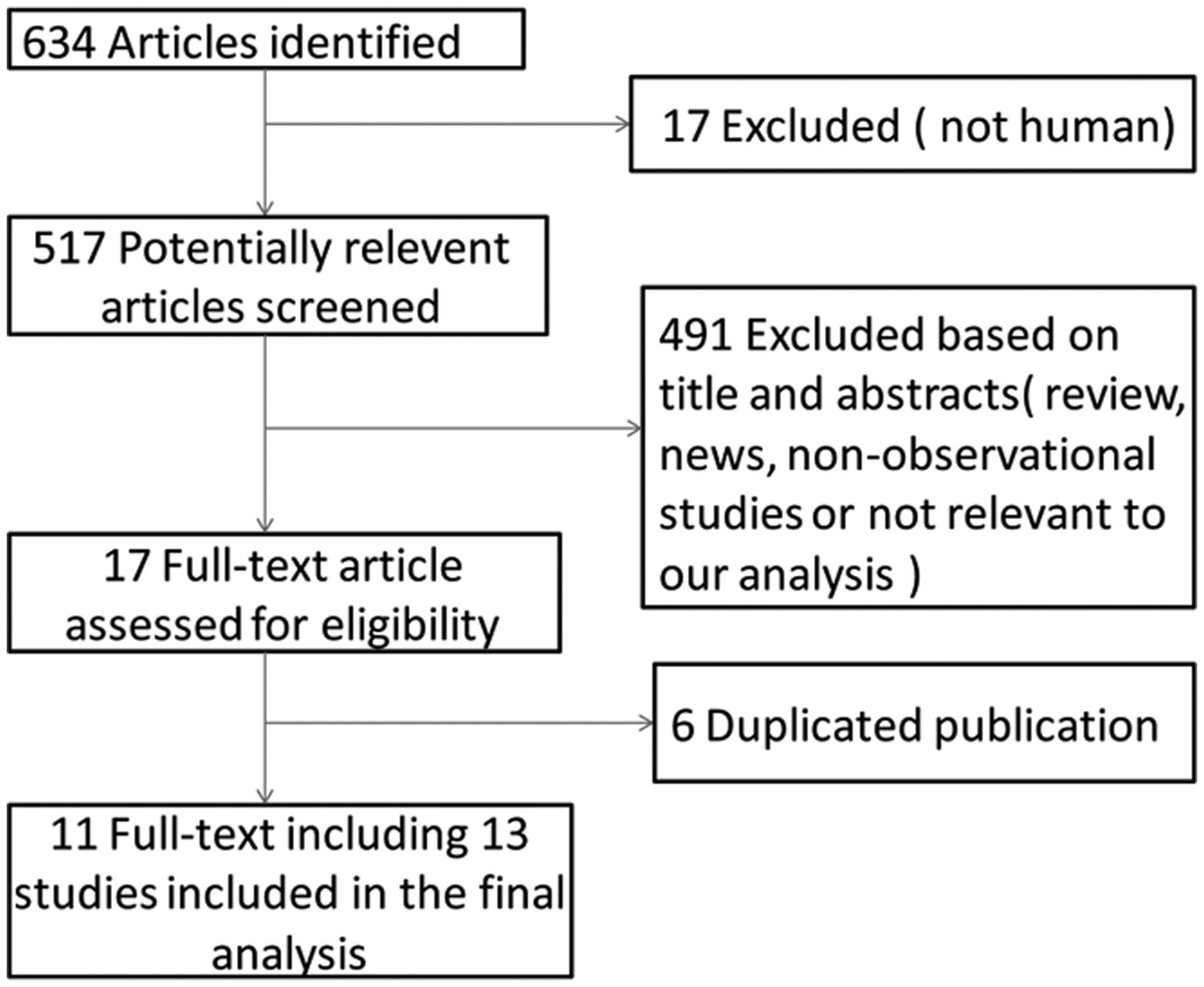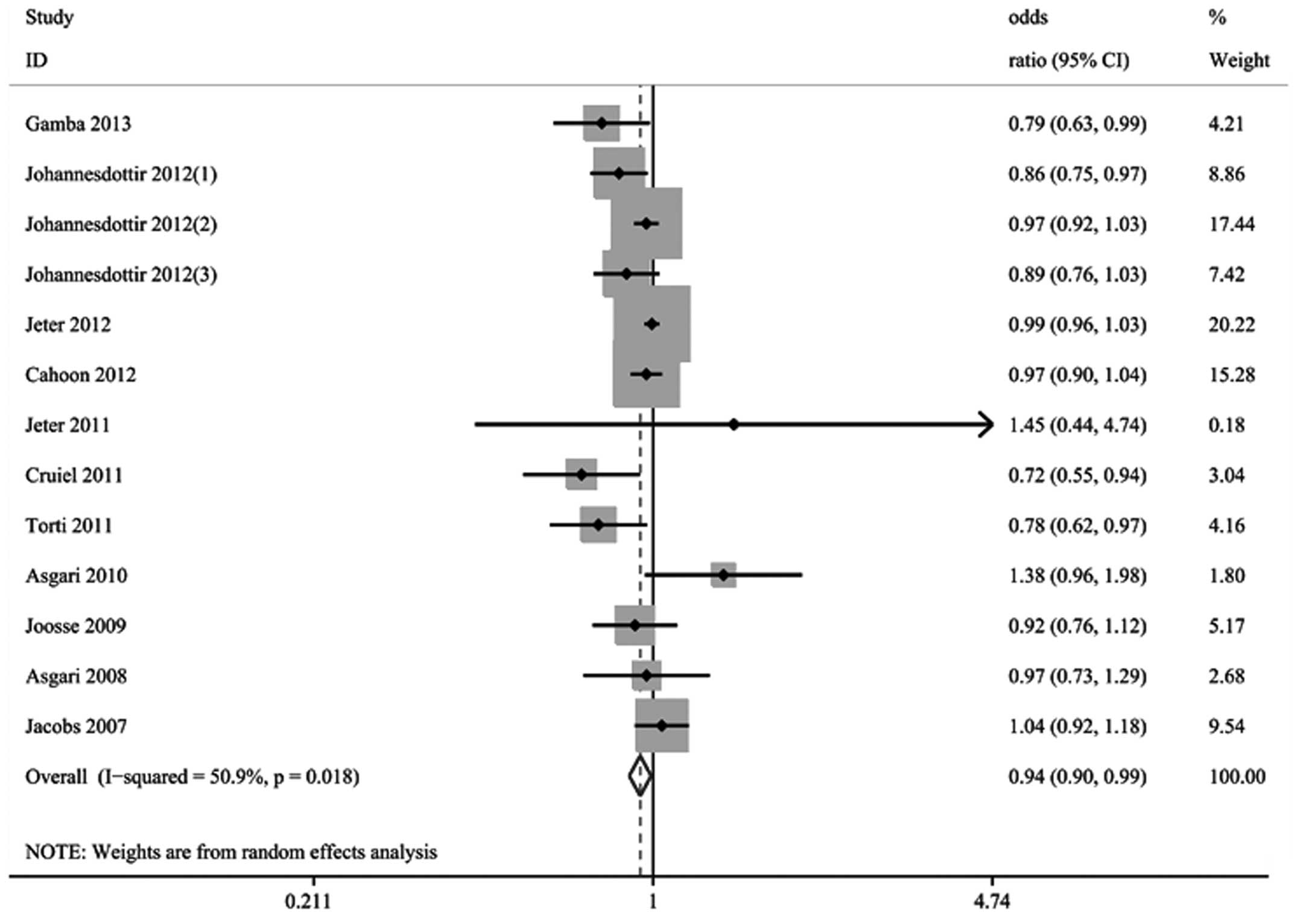|
1
|
D’Orazio J, Jarrett S, Amaro-Ortiz A and
Scott T: UV radiation and the skin. Int J Mol Sci. 14:12222–12248.
2013. View Article : Google Scholar : PubMed/NCBI
|
|
2
|
Marks R: An overview of skin cancers.
Incidence and causation. Cancer. 75:607–612. 1995. View Article : Google Scholar : PubMed/NCBI
|
|
3
|
Chen ST, Geller AC and Tsao H: Update on
the Epidemiology of Melanoma. Curr Dermatol Rep. 2:24–34. 2013.
View Article : Google Scholar : PubMed/NCBI
|
|
4
|
MacKie RM, Hauschild A and Eggermont AM:
Epidemiology of invasive cutaneous melanoma. Ann Oncol. 20(Suppl
6): vi1–vi7. 2009. View Article : Google Scholar : PubMed/NCBI
|
|
5
|
Saladi RN and Persaud AN: The causes of
skin cancer: a comprehensive review. Drugs Today (Barc). 41:37–53.
2005. View Article : Google Scholar
|
|
6
|
Council on Environmental Health, Section
on Dermatology. Balk SJ: Ultraviolet radiation: a hazard to
children and adolescents. Pediatrics. 127:588–597. 2011. View Article : Google Scholar : PubMed/NCBI
|
|
7
|
Kornek T and Augustin M: Skin cancer
prevention. J Dtsch Dermatol Ges. 11:283–296; quiz 297–298.
2013.PubMed/NCBI
|
|
8
|
Buckman SY, Gresham A, Hale P, et al:
COX-2 expression is induced by UVB exposure in human skin:
implications for the development of skin cancer. Carcinogenesis.
19:723–729. 1998. View Article : Google Scholar : PubMed/NCBI
|
|
9
|
Fosslien E: Molecular pathology of
cyclooxygenase-2 in neoplasia. Ann Clin Lab Sci. 30:3–21.
2000.PubMed/NCBI
|
|
10
|
Denkert C, Köbel M, Berger S, et al:
Expression of cyclooxygenase 2 in human malignant melanoma. Cancer
Res. 61:303–308. 2001.PubMed/NCBI
|
|
11
|
Nijsten T, Colpaert CG, Vermeulen PB, et
al: Cyclooxygenase-2 expression and angiogenesis in squamous cell
carcinoma of the skin and its precursors: a paired
immunohistochemical study of 35 cases. Br J Dermatol. 151:837–845.
2004. View Article : Google Scholar : PubMed/NCBI
|
|
12
|
Rao CV and Reddy BS: NSAIDs and
chemoprevention. Curr Cancer Drug Targets. 4:29–42. 2004.
View Article : Google Scholar : PubMed/NCBI
|
|
13
|
Harris RE, Beebe-Donk J, Doss H and Burr
Doss D: Aspirin, ibuprofen, and other non-steroidal
anti-inflammatory drugs in cancer prevention: a critical review of
non-selective COX-2 blockade (review). Oncol Rep. 13:559–583.
2005.PubMed/NCBI
|
|
14
|
Silva MT, Galvao TF, Zimmerman IR, Pereira
MG and Lopes LC: Non-aspirin non-steroidal anti-inflammatory drugs
for the primary chemoprevention of non-gastrointestinal cancer:
summary of evidence. Curr Pharm Des. 18:4047–4070. 2012. View Article : Google Scholar : PubMed/NCBI
|
|
15
|
Sneader W: The discovery of aspirin: a
reappraisal. BMJ. 321:1591–1594. 2000. View Article : Google Scholar : PubMed/NCBI
|
|
16
|
Asgari MM, Chren MM, Warton EM, Friedman
GD and White E: Association between nonsteroidal anti-inflammatory
drug use and cutaneous squamous cell carcinoma. Arch Dermatol.
146:388–395. 2010. View Article : Google Scholar : PubMed/NCBI
|
|
17
|
Asgari MM, Maruti SS and White E: A large
cohort study of nonsteroidal anti-inflammatory drug use and
melanoma incidence. J Natl Cancer Inst. 100:967–971. 2008.
View Article : Google Scholar : PubMed/NCBI
|
|
18
|
Cahoon EK, Rajaraman P, Alexander BH,
Doody MM, Linet MS and Freedman DM: Use of nonsteroidal
anti-inflammatory drugs and risk of basal cell carcinoma in the
United States Radiologic Technologists study. Int J Cancer.
130:2939–2948. 2012. View Article : Google Scholar
|
|
19
|
Curiel-Lewandrowski C, Nijsten T, Gomez
ML, Hollestein LM, Atkins MB and Stern RS: Long-term use of
nonsteroidal anti-inflammatory drugs decreases the risk of
cutaneous melanoma: results of a United States case-control study.
J Invest Dermatol. 131:1460–1468. 2011. View Article : Google Scholar : PubMed/NCBI
|
|
20
|
Gamba CA, Swetter SM, Stefanick ML, et al:
Aspirin is associated with lower melanoma risk among postmenopausal
Caucasian women: the Women’s Health Initiative. Cancer.
119:1562–1569. 2013. View Article : Google Scholar : PubMed/NCBI
|
|
21
|
Jacobs EJ, Thun MJ, Bain EB, Rodriguez C,
Henley SJ and Calle EE: A large cohort study of long-term daily use
of adult-strength aspirin and cancer incidence. J Natl Cancer Inst.
99:608–615. 2007. View Article : Google Scholar : PubMed/NCBI
|
|
22
|
Jeter JM, Bonner JD, Johnson TM and Gruber
SB: Nonsteroidal anti-inflammatory drugs and risk of melanoma. J
Skin Cancer. 2011:5985712011. View Article : Google Scholar : PubMed/NCBI
|
|
23
|
Jeter JM, Han J, Martinez ME, Alberts DS,
Qureshi AA and Feskanich D: Non-steroidal anti-inflammatory drugs,
acetaminophen, and risk of skin cancer in the Nurses’ Health Study.
Cancer Causes Control. 23:1451–1461. 2012. View Article : Google Scholar : PubMed/NCBI
|
|
24
|
Johannesdottir SA, Chang ET, Mehnert F,
Schmidt M, Olesen AB and Sørensen HT: Nonsteroidal
anti-inflammatory drugs and the risk of skin cancer: a
population-based case-control study. Cancer. 118:4768–4776. 2012.
View Article : Google Scholar : PubMed/NCBI
|
|
25
|
Joosse A, Koomen ER, Casparie MK, Herings
RM, Guchelaar HJ and Nijsten T: Non-steroidal anti-inflammatory
drugs and melanoma risk: large Dutch population-based case-control
study. J Invest Dermatol. 129:2620–2627. 2009. View Article : Google Scholar : PubMed/NCBI
|
|
26
|
Torti DC, Christensen BC, Storm CA, et al:
Analgesic and nonsteroidal anti-inflammatory use in relation to
nonmelanoma skin cancer: a population-based case-control study. J
Am Acad Dermatol. 65:304–312. 2011. View Article : Google Scholar : PubMed/NCBI
|
|
27
|
Wells GA, Shea B, O’Connell D, et al: The
Newcastle-Ottawa Scale (NOS) for assessing the quality of
nonrandomised studies in meta-analyses. Department of Epidemiology
and Community Medicine, University of Ottawa; Canada: http://www.ohri.ca/programs/clinical_epidemiology/oxford.htm.
Accessed October 12, 2007
|
|
28
|
Begg CB and Mazumdar M: Operating
characteristics of a rank correlation test for publication bias.
Biometrics. 50:1088–1101. 1994. View
Article : Google Scholar : PubMed/NCBI
|
|
29
|
Egger M, Davey Smith G, Schneider M and
Minder C: Bias in meta-analysis detected by a simple, graphical
test. BMJ. 315:629–634. 1997. View Article : Google Scholar : PubMed/NCBI
|
|
30
|
Higgins JP, Thompson SG, Deeks JJ and
Altman DG: Measuring inconsistency in meta-analyses. BMJ.
327:557–560. 2003. View Article : Google Scholar : PubMed/NCBI
|
|
31
|
DerSimonian R and Laird N: Meta-analysis
in clinical trials. Control Clin Trials. 7:177–188. 1986.
View Article : Google Scholar : PubMed/NCBI
|
|
32
|
Christenson LJ, Borrowman TA, Vachon CM,
et al: Incidence of basal cell and squamous cell carcinomas in a
population younger than 40 years. JAMA. 294:681–690. 2005.
View Article : Google Scholar : PubMed/NCBI
|
|
33
|
An KP, Athar M, Tang X, et al:
Cyclooxygenase-2 expression in murine and human nonmelanoma skin
cancers: implications for therapeutic approaches. Photochem
Photobiol. 76:73–80. 2002. View Article : Google Scholar : PubMed/NCBI
|
|
34
|
Asgari M, White E and Chren MM:
Nonsteroidal anti-inflammatory drug use in the prevention and
treatment of squamous cell carcinoma. Dermatol Surg. 30:1335–1342.
2004.PubMed/NCBI
|
|
35
|
Fürstenberger G, Marks F and Müller-Decker
K: Cyclooxygenase-2 and skin carcinogenesis. Prog Exp Tumor Res.
37:72–89. 2003. View Article : Google Scholar : PubMed/NCBI
|
|
36
|
Cole BF, Logan RF, Halabi S, et al:
Aspirin for the chemoprevention of colorectal adenomas:
meta-analysis of the randomized trials. J Natl Cancer Inst.
101:256–266. 2009. View Article : Google Scholar : PubMed/NCBI
|
|
37
|
Bardia A, Olson JE, Vachon CM, et al:
Effect of aspirin and other NSAIDs on postmenopausal breast cancer
incidence by hormone receptor status: results from a prospective
cohort study. Breast Cancer Res Treat. 126:149–155. 2011.
View Article : Google Scholar
|
|
38
|
Zhang X, Smith-Warner SA, Collins LC,
Rosner B, Willett WC and Hankinson SE: Use of aspirin, other
nonsteroidal anti-inflammatory drugs, and acetaminophen and
postmenopausal breast cancer incidence. J Clin Oncol. 30:3468–3477.
2012. View Article : Google Scholar : PubMed/NCBI
|
|
39
|
Burn J, Gerdes AM, Macrae F, et al: CAPP2
Investigators: Long-term effect of aspirin on cancer risk in
carriers of hereditary colorectal cancer: an analysis from the
CAPP2 randomised controlled trial. Lancet. 378:2081–2087. 2011.
View Article : Google Scholar : PubMed/NCBI
|

















